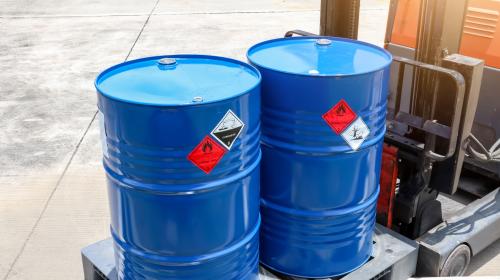In November 2019, the Environmental Protection Agency (EPA) signed a final rule that classifies aerosol cans as universal waste under the federal Resource Conservation and Recovery Act (RCRA) hazardous waste rule. Back in September, we mentioned that the EPA was proposing to add aerosol cans to the list of universal wastes, and mentioned that once this rule is effective, it will mean reduced requirements for collection and transportation. Though this rule has been signed by the EPA, keep in mind this is not the official version of the final rule. States, including Wisconsin, have not yet adopted this rule – which may take one to two years if they decide to adopt. View Wisconsin’s current regulations around aerosol cans here.
This final rule will impact a wide variety of businesses and generators, particularly retail businesses, and may drastically reduce regulatory costs. The Household & Commercial Products Association (HCPA) estimates that 3.75 billion aerosol cans were filled in the United States in 2016 both for household and commercial use. Aerosol cans make up almost 40 percent of retail items managed as hazardous waste at large retail facilities. This final rule is expected to reduce costs by providing a clear, protective system for handling hazardous waste aerosol cans.
Highlights of the final rule include:
- Aerosol can will no longer have to be labeled as hazardous wastes, though they will be subject to reduced marking requirements
- Aerosol cans may be stored for up to one year or even longer in some cases (rather than just 90 days for large quantity generators)
- They may be transported offsite without a hazardous waste transporter or hazardous waste manifest, and collection facilities not engaged in treatment or disposal will not have to be permitted as hazardous waste storage facilities
- Only large handlers of universal wastes (e.g., facilities that accumulate 5,000 kg or more of total universal wastes at any time) will be required to notify EPA and track shipments of the hazardous aerosol can wastes. Aerosol can wastes generated by households and Very Small Quantity Generators (VSQGs) meeting applicable requirements will remain exempt from the RCRA regulations. However, all aerosol wastes will remain subject to applicable requirements under the U.S. Department of Transportation (DOT) Hazardous Materials Regulations (HMR) (although under those rules, if aerosol cans are classified as universal wastes, they will not be subject to the enhanced DOT requirements that normally apply to RCRA hazardous wastes)
- Under the final rule, cans that dispense products without aeration will be eligible for management as universal wastes; however, gas-only products will be excluded. DOT is currently considering a petition to revise its definition to include these products
- In the final rule, the Agency agreed with the commenters and added new provisions specifying that “[u]niversal waste aerosol cans that show evidence of leakage must be packaged in a separate closed container or overpacked with absorbents, or immediately punctured and drained.” EPA also modified the definition of aerosol can so that it no longer requires that cans be “intact” to be classified as universal wastes
For more information on changes this final review will bring and proposed revisions, read here. To ensure your business remains compliant with the latest hazardous waste regulations, visit our services page or contact us directly.



